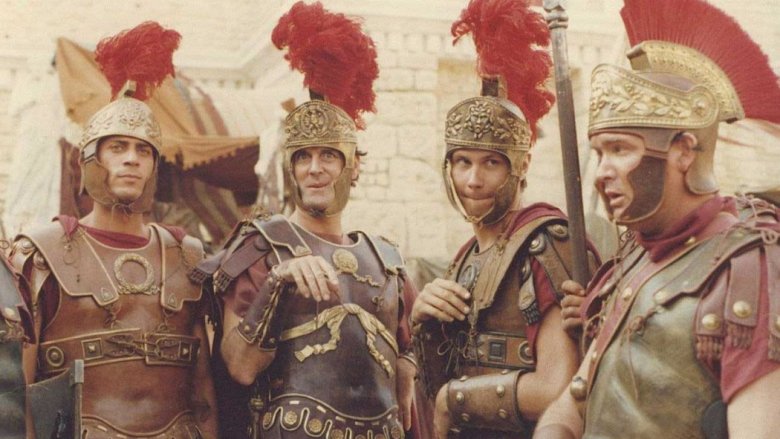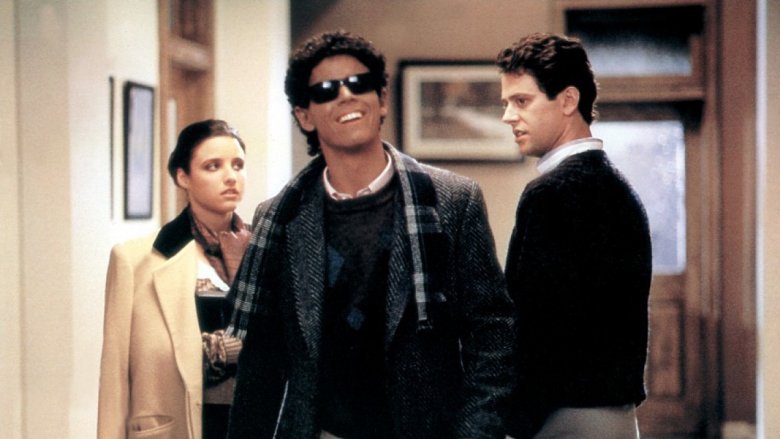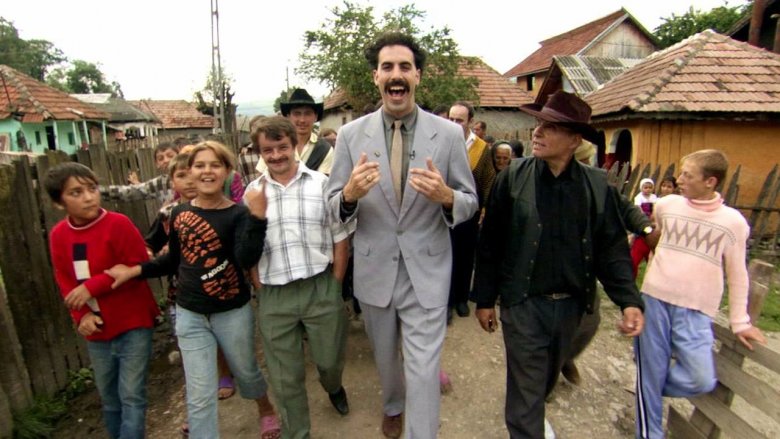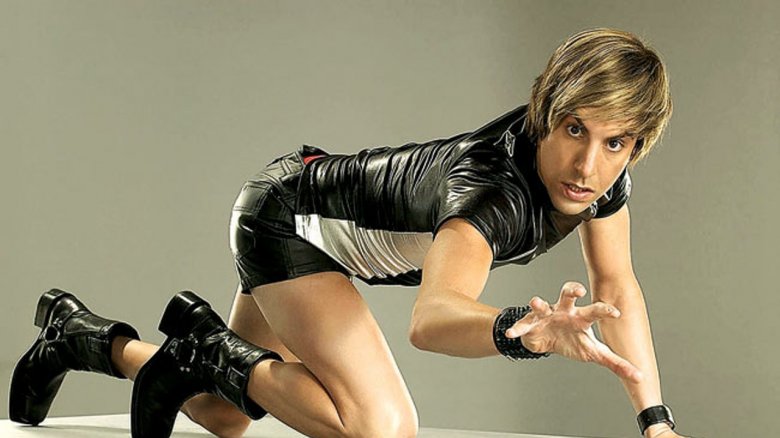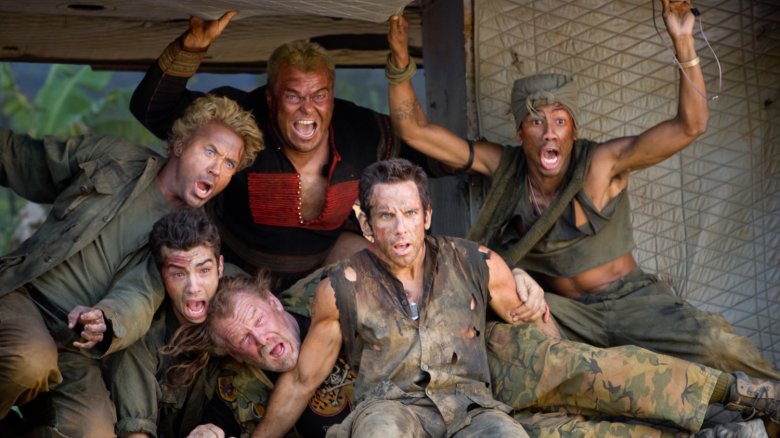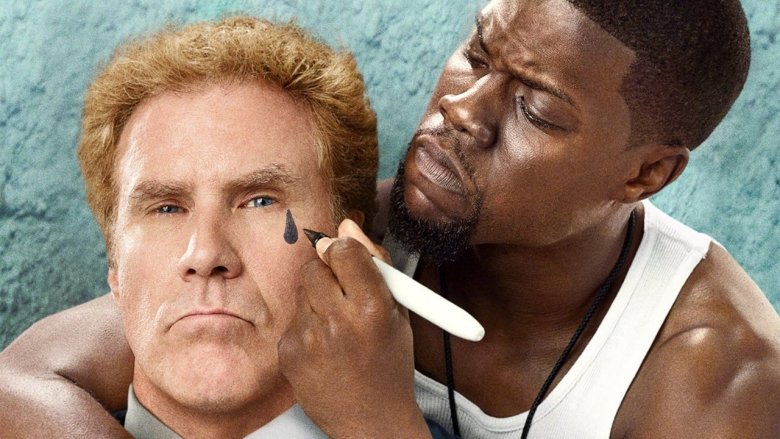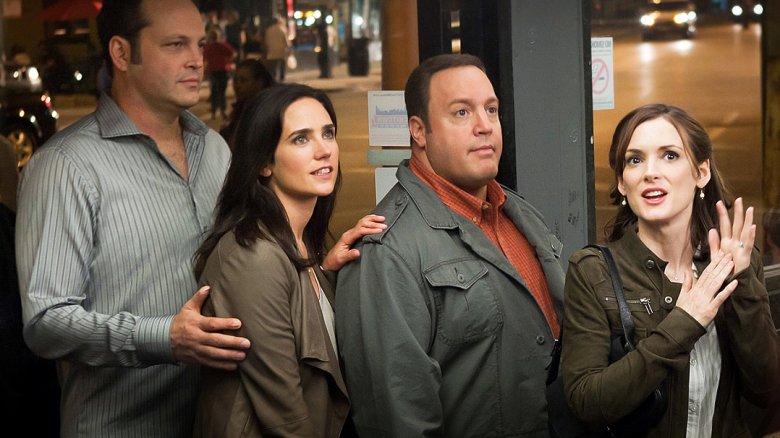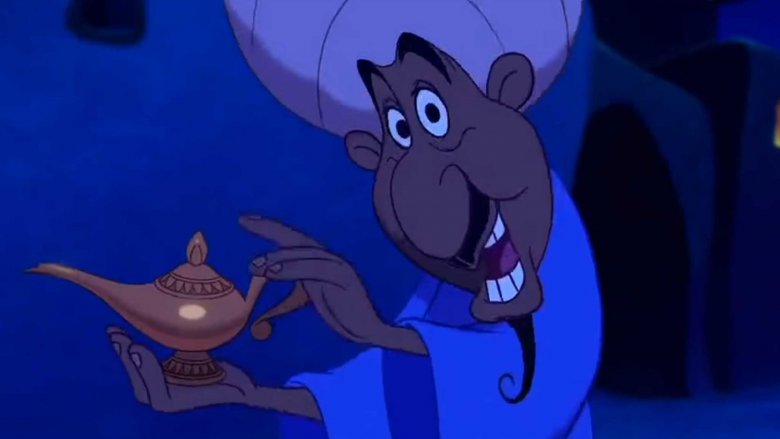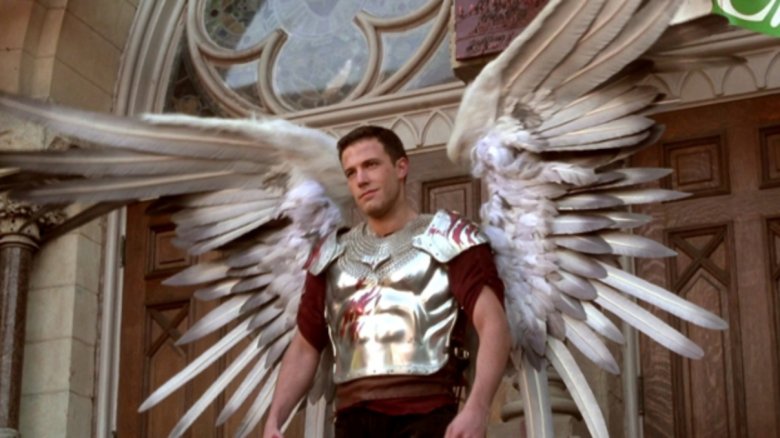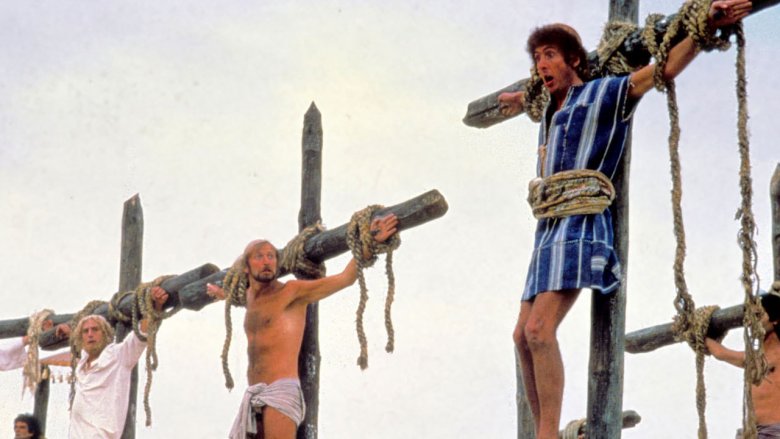Movie Jokes That Audiences Thought Went Too Far
Since the dawn of time, people have sought out ways to make each other laugh... while others have found a way to be offended by it. Whether a subject is too taboo, hits a little bit too close to home, or pushes people's gross-out buttons, audiences have sought the right to censor or denounce comedy material they deem to have gone too far.
But what defines how far is "too far" for a joke? Are issues of race, sexuality, gender, and religion fair game? What about when a joke could possibly be misconstrued enough to cause harm to real people? These are the kinds of questions filmmakers grapple with when they seek to spoof or satire subject matter that, let's face it, somebody somewhere is going to take to an internet message board and urge others to boycott. Hey, if those filmmakers are lucky, the audiences might even show up to picket their movies. There's no such thing as bad publicity, right?
Soul Man
1986's Soul Man tells the tale of college student Mark Watson, played by '80s heartthrob C. Thomas Howell. When his folks decide they aren't footing the bill for his pricey Harvard law school education, Mark does what any other quick-thinking student would do to solve his dilemma — he overdoses on bronzing pills to darken his skin and score a scholarship meant for African-American students. Along the way he falls in love with the African-American girl he stole the scholarship away from, and learns he's been living in quite a privileged bubble.
With taglines like "He didn't give up. He got down," it may not be too hard to understand why some audience members had an issue with a film that centers around a handsome young white man running around in blackface. The NAACP declared Soul Man racist, some screenings were picketed, and Spike Lee made public comments against the film, which co-star Rae Dawn Chong has said were unjust. "He'd never seen the movie and he just jumped all over it," Chong told TheWrap. "If you watch the movie, it's really making white people look stupid."
The controversy didn't stop audiences from seeing the film, which became a modest success, earning $27 million at the box office.
Borat
In 2006, Sacha Baron Cohen brought one of his most beloved and frequently misunderstood television characters to the big screen in Borat, Cultural Learnings of America for Make Benefit Glorious Nation of Kazakhstan. Those in on the joke delighted in the antics of the misogynistic, racist, and wildly anti-Semitic Borat as he inserted himself into one mortifying situation after another, traveling America with his documentary crew and seeking out Pamela Anderson. The unsuspecting victims of his pranks weren't always pleased to learn they'd become the butt of Cohen's often politically charged jokes, but nobody was more offended than the actual nation of Kazakhstan.
A government spokesman told ABC News that the people of Kazakhstan were offended by the character, while a member of the Kazakh Foreign Ministry said Cohen may be "serving someone's political order designed to present Kazakhstan and its people in a derogatory way." Cohen never apologized to Kazakhstan; in response to the country's television and newspaper ads denouncing the film, he staged a press conference in front of the Kazakh embassy in Washington DC. A very in-character Borat claimed that the Kazakh president was in town to promote the film and doubled down on his offensive remarks, saying, "I would like to make a comment on the recent advertisements on television and in media about my nation of Kazakhstan saying that women are treated equally, and that all religions are tolerated. These are disgusting fabrications."
Bruno
After Borat, Universal Pictures was prepared for backlash when it released Sacha Baron Cohen's next film, Bruno, based on the homosexual Austrian party-boy character he'd created on his television show. The studio reached out to the Gay & Lesbian Alliance Against Defamation League (GLAAD) in hopes that they'd support the film, inviting the organization to advance screenings and seeking feedback. What the studio got from GLAAD, however, was a major thumbs down, with the group stating Bruno reinforced negative stereotypes and "decreases the public's comfort with gay people."
Of particular concern to the organization was a specific scene in the film that shows Bruno holding his infant son in a hot tub that is also occupied by two men engaged in a sexual act. The organization went on to say that though they recognized that the film sought to challenge homophobia with the use of satire, they thought the filmmakers missed the mark with scenes built around "stock stereotypes and situations that make gay people and families the butt of crude jokes." Despite GLAAD's objections, the film did well, earning over $100 million worldwide.
Tropic Thunder
2008's Tropic Thunder was a Hollywood satire about a cast of big-budget actors — that itself featured a cast of big-budget actors like Jack Black, Ben Stiller, and Tom Cruise. It was a hit at the box office, and even earned an Oscar nomination for Robert Downey Jr. Critics appreciated the film's biting satire, but there were plenty of audience members who did not appreciate the film's use of the word "retard" and its depiction of Ben Stiller's character's role as a mentally disabled man in the film-within-a-film Simple Jack.
Tropic Thunder's L.A. opening was met with protesters from organizations like the Special Olympics and the American Association of People with Disabilities, who held signs that read "Call me by my name, not by my label." Previous complaints from the groups led DreamWorks to pull some promotional materials, particularly a website that featured Stiller's character in Simple Jack. It wasn't enough for groups to stop calling for a boycott. Timothy Shriver, Chairman of the Special Olympics, told NPR, "Humor is great, but when it crosses the line and runs the risk of producing hate and exclusion and loneliness and real human suffering, it crosses the line. This one went too far."
Get Hard
Director Etan Cohen is no stranger to courting controversy with his films — he was also a co-screenwriter on Tropic Thunder. Cohen's Get Hard, a satire that took aim at race, class, and the prison system, starred Will Ferrell and Kevin Hart. Though it didn't score with critics, it did well at the box office, racking up over $100 million worldwide.
A chief complaint against the film was its repeated use of homophobic and racist jokes and stereotypes, particularly scenes making light of the serious issue of prison rape. Another complaint? Most critics just didn't think Get Hard was all that funny. In response to a SXSW audience member's comment that the film was racist, Cohen replied, "The truth was that this was a really delicate balance. We wanted to think about stereotypes but not go too far." Ferrell didn't seem all that fazed by the critics, telling the Associated Press, "Any time you're going to do an R-rated comedy, you're going to offend someone."
"The trick to keeping it funny," added Hart, "is not being afraid to push the envelope."
The Dilemma
Ron Howard directed 2011's The Dilemma, a film in which Vince Vaughn's character debates whether to tell his best bud (played by Kevin James) that his wife has been unfaithful. Audiences didn't take issue with the premise — the controversy surrounding the film stemmed from a scene in which Vaughn sees an electric car and deems it "gay." The gag was featured in the trailers for the film, and that's where The Dilemma's troubles began.
CNN's Anderson Cooper publicly criticized the joke, and Universal Pictures removed the line from the trailers, but not from the film. Howard, who had final cut on the movie, explained to the Los Angeles Times that while he might not personally agree with the character's choice of language, he believed that keeping the offensive line in the film was an important part of showing the traits of Vaughn's inappropriate character. "I defend the right for some people to express offense at a joke as strongly as I do the right for that joke to be in a film," said Howard. "But if storytellers, comedians, actors and artists are strong armed into making creative changes, it will endanger comedy as both entertainment and a provoker of thought."
Aladdin
1992's Aladdin is a beloved entry in the Disney animation catalog, featuring classic songs and a memorable performance by Robin Williams as the Genie. But not everyone was happy about the film: it also stirred up some controversy with audiences who felt it was racist in its depiction of Arab characters.
Of particular offense was a line in the opening song, "Arabian Nights," that found a character singing, "Oh I come from a land, from a faraway place, where the caravan camels roam. Where they cut off your ear if they don't like your face, It's barbaric, but hey, it's home." Prior to the home video release, Disney subbed in a substitute lyric previously written by the late lyricist Howard Ashman: "Oh I come from a land, from a faraway place, where the caravan camels roam. Where it's flat and immense, and the heat is intense. It's barbaric, but hey, it's home."
Albert Mokhiber of the American-Arab Anti-Discrimination Committee told the Los Angeles Times that though he felt Disney did the right thing by altering the lyric, the use of the word "barbaric" was still offensive. Disney responded that the word "barbaric" in this context was a reference to the climate.
Peter Rabbit
In 2018, Sony Pictures' live-action/CGI Peter Rabbit drew a bit of backlash for portraying the beloved Beatrix Potter character less as a cuddly bunny and more of a schoolyard bully. In the most controversial scene, Peter and his gang assault Mr. MacGregor with blackberries — a food they know he's severely allergic to. MacGregor narrowly avoids death with the aid of an EpiPen he luckily has on hand, but audiences were quick to take to social media to announce their outrage using the hashtag #boycottpeterrabbit.
The Asthma and Allergy Foundation of America (AAFA) issued an open letter to Sony reminding the studio of recent "accounts of children using food to bully and assault children with food allergies ... some cases have resulted in death for the child with food allergies and criminal charges for the attackers." AAFA strongly urged Sony to refrain from mocking food allergies again in future projects.
Within a day, Sony issued a reply, stating that they "sincerely regret not being more aware and sensitive to this issue, and we truly apologize."
Dogma
The fourth film from Kevin Smith's "View Askewniverse," 1999's Dogma featured many familiar faces from his previous works. Starring Ben Affleck and Matt Damon as two fallen angels who seek to re-enter heaven on a loophole that will destroy the world if it proves God's fallibility, the religious satire pitted Affleck and Damon's characters against a female descendant of Christ who moonlights at an abortion clinic, a 13th apostle, and two stoners-turned-prophets, Jay and Silent Bob.
Unsurprisingly, some audiences had a pretty big problem with that premise — not to mention plot details that included a Catholic church redesigning their look to include a life-sized statue of a thumbs up, dude-bro Jesus. Smith told the Austin Chronicle that the film brought in "hundreds of thousands of pieces of hate mail, including three death threats." The Catholic League declared the film blasphemous based on an early version of the script, and protestors were on hand for screenings, with Kevin Smith even joining them near his hometown in NJ. The film was a modest success, bringing in over $30 million worldwide.
Life of Brian
Religion is the best way to mortally offend a huge group of people, so it's no shock that 1979's Life of Brian, brought to us by the now-iconic crew known as Monty Python, drew ire with its skewering satire of Christianity.
Brian of Nazareth is just a normal guy who happens to have been born next door to Jesus. Confused followers mistake him for the Messiah, and through one series of mishaps after another, he ends up crucified with a group of fellow prisoners who end the film with the rousing song "Always Look on the Bright Side of Life."
Religious organizations came out in droves to decry Life of Brian as blasphemy — including the Catholic Film Monitoring Office, who declared that it would be a sin to even see the film. It was banned in many places; Swedish advertisers used the slogan "so funny it was banned in Norway" to market it. The members of Monty Python maintained that the film wasn't even about Jesus, but simply a satire of Biblical times.
The hoopla did nothing to stop people from seeing the film, which was a box office success. It remains a critical darling, and has been named to multiple lists of all-time film comedy classics.
